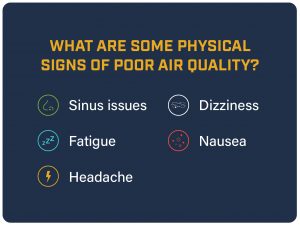 While the intricacies of COVID-19 are still being researched, many of us are wondering if HVAC filtration can help keep the virus at bay? As we are learning, scientists point to respiratory droplets as the primary mode of transmission. This means infection can be passed between people through coughing or sneezing.
While the intricacies of COVID-19 are still being researched, many of us are wondering if HVAC filtration can help keep the virus at bay? As we are learning, scientists point to respiratory droplets as the primary mode of transmission. This means infection can be passed between people through coughing or sneezing.
It is also possible for viruses, like COVID-19, as well as other contaminants, to circulate through your commercial or residential HVAC system. What does this mean for your health and safety? Can home air purifiers filter out coronavirus? Your Beaverton and Portland HVAC installers share important details below.
Can Your HVAC’s Air Filter Kill Coronavirus?
Air filters in your commercial or home heating and air conditioning units trap and contain microscopic particles and contaminants. Air filtration occurs when expelled air is sucked back into the HVAC unit, conditioned, and forced back out. A high-quality, clean air filter can prevent pollutants from redistributing back into the air.
While proper filtration in your HVAC unit can be a component that reduces exposure to pollutants, it is not considered a preventative measure against COVID-19 transmission. The best defense against coronavirus is to follow CDC guidelines like covering your mouth, washing your hands, and disinfecting surfaces. Even though HVAC filtration systems can’t kill Coronavirus, they can help maintain good indoor air quality, which can alleviate contaminants, germs, and other viruses. Promoting good indoor air quality can assist in keeping you and your occupants healthy.
Indoor Air Quality and Health
HVAC professionals know that poor indoor air quality (IAQ) in your residential or commercial  property can negatively affect your health. As we spend more and more time at home, it’s necessary to think about the indoor air we breathe every day. It’s also crucial to think about IAQ in commercial buildings as people begin returning to work. Will employees be exposed to poor indoor air, potentially making them sick? Are we exposing ourselves to pollutants or germs? To protect yourself and others from getting sick it’s necessary to learn more about IAQ and what it means for you.
property can negatively affect your health. As we spend more and more time at home, it’s necessary to think about the indoor air we breathe every day. It’s also crucial to think about IAQ in commercial buildings as people begin returning to work. Will employees be exposed to poor indoor air, potentially making them sick? Are we exposing ourselves to pollutants or germs? To protect yourself and others from getting sick it’s necessary to learn more about IAQ and what it means for you.
- What is indoor air quality? Indoor air quality refers to the level of air purity and how it affects the comfort and health of occupants in commercial and residential spaces. Poor IAQ can be caused by a variety of factors such as humidity, mold, chemicals, and poor ventilation.
- What are some physical signs of poor air quality? Sinus issues, fatigue, headache, dizziness, and nausea are just some of the symptoms of poor air quality.
- What can you do to improve indoor air quality? Air filtration in your commercial and residential HVAC system is one of your main weapons to fight poor air quality. A clean, properly installed air filter effectively removes a variety of airborne agents like dust, mold, and germs. Without proper care and timely replacement, air filters can become clogged with debris. This can make indoor air quality worse by recirculating contaminants into your breathing air.
Choosing the Right Filtration System for Your HVAC System
Not all air filters are created equal. Choosing the right air filter from your HVAC system is paramount to clean IAQ. Investing in a high-quality air filter, that can effectively trap particles, means less pollutants traveling through your indoor space.
To determine the performance level of an air filter check its MERV (minimum efficiency reporting value) rating. Higher MERV ratings indicate more effective filtration. In addition to installing a high-quality filter it’s extremely important to inspect air filters monthly for any signs of dirt and debris. If the filter is clogged or dirty, change it immediately. Remember, a clean filter means cleaner IAQ.
HVAC Air Quality Services for Your Home or Office
AAA Heating and Cooling serves the Beaverton and Portland Metro area. Need advice on the best MERV rated air filter? Unsure of the air quality in your commercial or residential space? Contact one of our HVAC professionals today for all your service and repair needs.